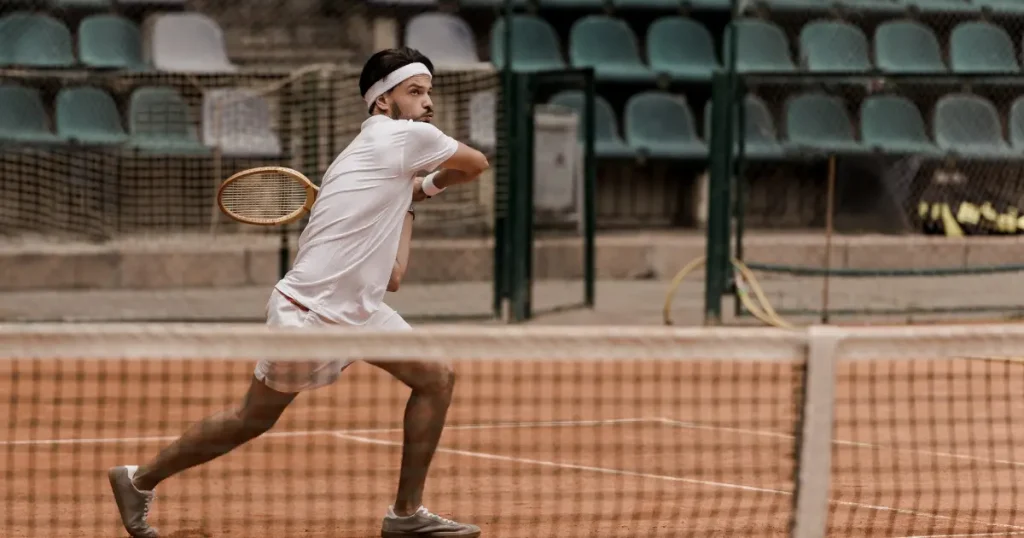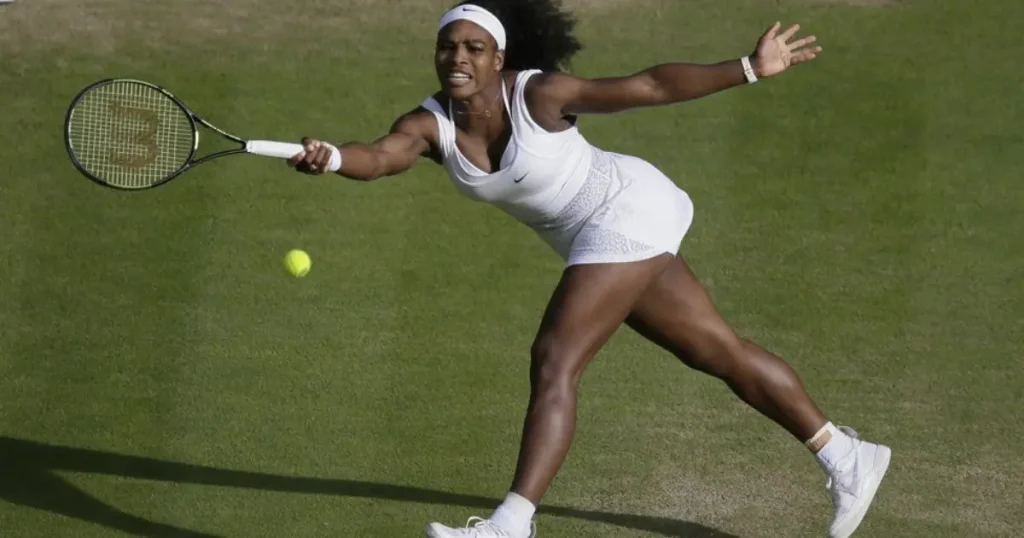Why Tennis Players Grunt: The Science, Psychology, And Controversy Behind The Noise
Tennis is a sport that combines physical prowess, mental agility, and technical precision. One of the most distinctive aspects of the game, however, is the grunting sound made by players during their shots. If you've ever wondered why tennis players grunt, you're not alone. This article dives deep into the science, psychology, and controversy surrounding this phenomenon.
Grunting in tennis has become a topic of discussion among fans, players, and analysts alike. It's not just a habit but a strategic tool that can influence performance and even affect opponents. Understanding why tennis players grunt requires an exploration of physiological, psychological, and competitive factors.
In this article, we'll uncover the reasons behind grunting, examine its effects on performance, and address the debates surrounding its use in professional tennis. Whether you're a casual fan or a die-hard enthusiast, this comprehensive guide will provide valuable insights into the world of tennis grunting.
- Heather And Chris Dempsey 2024
- Koreen Odiney
- Matt And Amy Divorce
- Jessica Simpson Hairstyles
- Quinta Brunson Body
Table of Contents
- The Science Behind Grunting
- Psychological Advantages of Grunting
- The Controversy Around Grunting
- Famous Tennis Players Known for Grunting
- Impact of Grunting on Opponents
- Training Techniques to Enhance Grunting
- Rules and Regulations on Grunting
- Long-Term Effects of Grunting
- How to Reduce Excessive Grunting
- Conclusion
The Science Behind Grunting
Grunting in tennis is not just noise—it's a physiological phenomenon that enhances performance. Research shows that grunting helps players generate more power and maintain better form during strokes. When a player grunts, they engage their core muscles more effectively, which translates into stronger and more accurate shots.
Studies conducted by sports scientists have demonstrated that grunting can increase racquet head speed and ball velocity. This is because the act of exhaling forcefully during physical exertion stabilizes the core and improves muscle coordination. In essence, grunting serves as a natural mechanism to optimize performance.
How Grunting Improves Muscle Coordination
Grunting is closely linked to the concept of "valsalva maneuver," where athletes hold their breath briefly and exhale forcefully. This technique is commonly used in weightlifting and other sports to maximize strength and stability. In tennis, grunting achieves a similar effect by enhancing muscle engagement and reducing the risk of injury.
- Tiny House With Wrap Around Porch
- Hugh Grant Colin Firth Friends
- Northern Lights Alabama Tonight
- Verna Heath Channelview Tx
- Tyrus Kids Ages
- Engages core muscles for better stability
- Improves coordination between upper and lower body movements
- Reduces stress on joints and tendons
Psychological Advantages of Grunting
Beyond the physical benefits, grunting also offers psychological advantages. It helps players maintain focus, release tension, and stay in the zone during high-pressure situations. The sound of grunting can serve as a mental cue, signaling the player to concentrate on the task at hand.
Boosting Confidence Through Sound
Many players report feeling more confident when they grunt. This is because the act of making noise during a shot reinforces the sensation of power and control. It also helps mask any doubts or anxieties that may arise during crucial moments in a match.
- Reinforces a sense of dominance on the court
- Masks internal doubts and fears
- Enhances mental resilience
The Controversy Around Grunting
While grunting has its benefits, it has also sparked controversy in the tennis world. Some players and fans argue that excessive grunting can be distracting and even disruptive. Critics claim that certain players use grunting as a tactical tool to throw off their opponents.
Does Grunting Provide an Unfair Advantage?
Opponents of grunting argue that it can interfere with an opponent's ability to hear the ball striking the racquet. This auditory feedback is crucial for anticipating the trajectory and speed of the ball. Excessive grunting, therefore, may give the grunter an unfair advantage by masking important auditory cues.
Studies have shown that loud grunting can indeed affect an opponent's reaction time. In one experiment, players who listened to recordings of grunts while trying to react to ball sounds experienced delays in their responses. This raises ethical questions about the fairness of using grunting as a competitive strategy.
Famous Tennis Players Known for Grunting
Several professional tennis players are renowned for their distinctive grunts. Maria Sharapova, for example, is famous for her loud and sustained grunting style. Other notable grunters include Rafael Nadal, Serena Williams, and Novak Djokovic. Each player has their unique way of grunting, reflecting their individual playing styles.
Biography of Maria Sharapova
Maria Sharapova is one of the most recognizable figures in tennis history. Born on April 19, 1987, in Nyagan, Russia, she rose to prominence as a teenager and became a Grand Slam champion at the age of 17. Known for her powerful baseline game and competitive spirit, Sharapova's grunting style has been both admired and criticized.
| Full Name | Maria Yuryevna Sharapova |
|---|---|
| Date of Birth | April 19, 1987 |
| Place of Birth | Nyagan, Russia |
| Height | 6'2" (188 cm) |
| Turned Pro | 2001 |
Impact of Grunting on Opponents
The impact of grunting on opponents varies depending on individual tolerance levels. Some players are able to tune out the noise, while others find it distracting. The key factor is the volume and frequency of the grunts. Excessive or overly loud grunting can disrupt an opponent's concentration and timing.
Strategies to Cope with Grunting Opponents
Players who struggle with grunting opponents can employ various strategies to mitigate its effects. These include focusing on visual cues, practicing mindfulness techniques, and developing mental resilience. Coaches also play a crucial role in helping players adapt to different playing styles and distractions.
- Focus on visual rather than auditory cues
- Practice mindfulness and concentration exercises
- Develop mental resilience through visualization techniques
Training Techniques to Enhance Grunting
While grunting comes naturally to some players, others may need to develop it through training. Coaches often incorporate breathing exercises and core strengthening routines to enhance grunting effectiveness. These techniques not only improve performance but also reduce the risk of injury.
Core Strengthening Exercises for Grunting
Core strengthening exercises are essential for effective grunting. Activities such as planks, Russian twists, and medicine ball throws help build the muscles needed for powerful exhalations. These exercises also improve overall stability and balance on the court.
- Planks for core endurance
- Russian twists for rotational strength
- Medicine ball throws for explosive power
Rules and Regulations on Grunting
Tennis governing bodies have established rules to address excessive grunting. The International Tennis Federation (ITF) and Women's Tennis Association (WTA) both have guidelines to ensure fair play and minimize distractions. While there are no specific penalties for grunting, players can be penalized for disruptive behavior.
Penalties for Excessive Grunting
In extreme cases, players may receive warnings or penalties for excessive grunting. These penalties are rare but serve as a reminder that grunting should not interfere with the fairness of the game. Officials closely monitor matches to ensure that all players adhere to the rules and maintain a respectful playing environment.
Long-Term Effects of Grunting
While grunting has short-term benefits, its long-term effects are still being studied. Some researchers suggest that excessive grunting could lead to vocal cord strain or other health issues. Players must strike a balance between optimizing performance and preserving their vocal health.
Preventing Vocal Cord Strain
To prevent vocal cord strain, players can practice proper breathing techniques and limit the volume of their grunts. Hydration and vocal rest are also important for maintaining vocal health. Coaches and trainers often work with players to develop sustainable grunting habits that minimize the risk of injury.
How to Reduce Excessive Grunting
For players who wish to reduce their grunting, there are several strategies they can employ. These include practicing silent breathing techniques, focusing on mental cues, and gradually adjusting their playing style. By making conscious efforts to control their grunting, players can enhance their overall performance and reduce distractions for opponents.
Tips for Quieter Playing
Quieter playing does not mean sacrificing power or precision. Players can achieve balance by incorporating the following tips:
- Practice silent breathing exercises
- Focus on mental rather than auditory cues
- Gradually adjust grunting volume and frequency
Conclusion
Grunting in tennis is a multifaceted phenomenon with physiological, psychological, and competitive dimensions. While it offers numerous benefits, it also raises ethical questions about fairness and distraction. Understanding the science behind grunting and its impact on opponents is essential for appreciating its role in the sport.
We encourage readers to share their thoughts and experiences with grunting in the comments section below. Are you a fan of grunting or do you find it distracting? Your feedback will help us explore this topic further and provide valuable insights for fellow tennis enthusiasts.
For more articles on tennis and sports science, explore our website and stay updated on the latest trends and developments in the world of sports. Thank you for reading!
- Who Are The Five Living Presidents
- Girl Who Killed Herself After Being Bullied 2024 Aubrey
- Kelly Clarkson Red Carpet
- Katy Perry Bangs
- Young Thug Dating

Why Do Tennis Players Grunt? A Comprehensive Guide

Why Do Tennis Players Grunt? A Comprehensive Guide

Why Do Tennis Players Grunt? A Comprehensive Guide